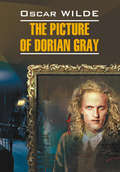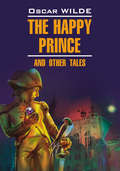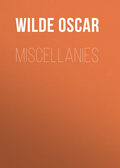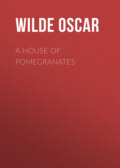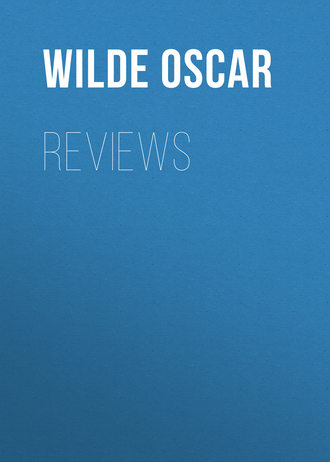
Оскар Уайльд
Reviews
TWO NEW NOVELS
(Pall Mall Gazette, September 16, 1880.)
Most modern novels are more remarkable for their crime than for their culture, and Mr. G. Manville Fenn’s last venture is no exception to the general rule. The Master of the Ceremonies is turbid, terrifying and thrilling. It contains, besides many ‘moving accidents by flood and field,’ an elopement, an abduction, a bigamous marriage, an attempted assassination, a duel, a suicide, and a murder. The murder, we must acknowledge, is a masterpiece. It would do credit to Gaboriau, and should make Miss Braddon jealous. The Newgate Calendar itself contains nothing more fascinating, and what higher praise than this can be given to a sensational novel? Not that Lady Teigne, the hapless victim, is killed in any very new or subtle manner. She is merely strangled in bed, like Desdemona; but the circumstances of the murder are so peculiar that Claire Denville, in common with the reader, suspects her own father of being guilty, while the father is convinced that the real criminal is his eldest son. Stuart Denville himself, the Master of the Ceremonies, is most powerfully drawn. He is a penniless, padded dandy who, by a careful study of the ‘grand style’ in deportment, has succeeded in making himself the Brummel of the promenade and the autocrat of the Assembly Rooms. A light comedian by profession, he is suddenly compelled to play the principal part in a tragedy. His shallow, trivial nature is forced into the loftiest heroism, the noblest self-sacrifice. He becomes a hero against his will. The butterfly goes to martyrdom, the fop has to become fine. Round this character centres, or rather should centre, the psychological interest of the book, but unfortunately Mr. Fenn has insisted on crowding his story with unnecessary incident. He might have made of his novel ‘A Soul’s Tragedy,’ but he has produced merely a melodrama in three volumes. The Master of the Ceremonies is a melancholy example of the fatal influence of Drury Lane on literature. Still, it should be read, for though Mr. Fenn has offered up his genius as a holocaust to Mr. Harris, he is never dull, and his style is on the whole very good. We wish, however, that he would not try to give articulate form to inarticulate exclamations. Such a passage as this is quite dreadful and fails, besides, in producing the effect it aims at:
‘He – he – he, hi – hi – hi, hec – hec – hec, ha – ha – ha! ho – ho! Bless my – hey – ha! hey – ha! hugh – hugh – hugh! Oh dear me! Oh – why don’t you – heck – heck – heck – heck – heck! shut the – ho – ho – ho – ho – hugh – hugh – window before I – ho – ho – ho – ho!’
This horrible jargon is supposed to convey the impression of a lady coughing. It is, of course, a mere meaningless monstrosity on a par with spelling a sneeze. We hope that Mr. Fenn will not again try these theatrical tricks with language, for he possesses a rare art – the art of telling a story well.
A Statesman’s Love, the author tells us in a rather mystical preface, was written ‘to show that the alchemist-like transfiguration supposed to be wrought in our whole nature by that passion has no existence in fact,’ but it cannot be said to prove this remarkable doctrine.
It is an exaggerated psychological study of a modern woman, a sort of picture by limelight, full of coarse colours and violent contrasts, not by any means devoid of cleverness but essentially false and over-emphasised. The heroine, Helen Rohan by name, tells her own story and, as she takes three volumes to do it in, we weary of the one point of view. Life to be intelligible should be approached from many sides, and valuable though the permanent ego may be in philosophy, the permanent ego in fiction soon becomes a bore. There are, however, some interesting scenes in the novel, and a good portrait of the Young Pretender, for though the heroine is absolutely a creation of the nineteenth century, the background of the story is historical and deals with the Rebellion of ’45. As for the style, it is often original and picturesque; here and there are strong individual touches and brilliant passages; but there is also a good deal of pretence and a good deal of carelessness.
What can be said, for instance, about such expressions as these, taken at random from the second volume, – ‘evanishing,’ ‘solitary loneness,’ ‘in my then mood,’ ‘the bees might advantage by to-day,’ ‘I would not listen reverently as did the other some who went,’ ‘entangling myself in the net of this retiari,’ and why should Bassanio’s beautiful speech in the trial scene be deliberately attributed to Shylock? On the whole, A Statesman’s Love cannot be said to be an artistic success; but still it shows promise and, some day, the author who, to judge by the style, is probably a woman, may do good work. This, however, will require pruning, prudence and patience. We shall see.
(1) The Master of the Ceremonies. By G. Manville Fenn. (Ward and Downey.)
(2) A Statesman’s Love. By Emile Bauche. (Blackwood and Co.)
BEN JONSON
(Pall Mall Gazette, September 20, 1886.)
In selecting Mr. John Addington Symonds to write the life of Ben Jonson for his series of ‘English Worthies,’ Mr. Lang, no doubt, exercised a wise judgment. Mr. Symonds, like the author of Volpone, is a scholar and a man of letters; his book on Shakspeare’s Predecessors showed a marvellous knowledge of the Elizabethan period, and he is a recognised authority on the Italian Renaissance. The last is not the least of his qualifications. Without a full appreciation of the meaning of the Humanistic movement it is impossible to understand the great struggle between the Classical form and the Romantic spirit which is the chief critical characteristic of the golden age of the English drama, an age when Shakespeare found his chief adversary, not among his contemporaries, but in Seneca, and when Jonson armed himself with Aristotle to win the suffrages of a London audience. Mr. Symonds’ book, consequently, will be opened with interest. It does not, of course, contain much that is new about Jonson’s life. But the facts of Jonson’s life are already well known, and in books of this kind what is true is of more importance than what is new, appreciation more valuable than discovery. Scotchmen, however, will, no doubt, be interested to find that Mr. Symonds has succeeded in identifying Jonson’s crest with that of the Johnstones of Annandale, and the story of the way the literary Titan escaped from hanging, by proving that he could read, is graphically told.
On the whole, we have a vivid picture of the man as he lived. Where picturesqueness is required, Mr. Symonds is always good. The usual comparison with Dr. Johnson is, of course, brought out. Few of ‘Rare Ben’s’ biographers spare us that, and the point is possibly a natural one to make. But when Mr. Symonds calls upon us to notice that both men made a journey to Scotland, and that ‘each found in a Scotchman his biographer,’ the parallel loses all value. There is an M in Monmouth and an M in Macedon, and Drummond of Hawthornden and Boswell of Auchinleck were both born the other side of the Tweed; but from such analogies nothing is to be learned. There is no surer way of destroying a similarity than to strain it.
As for Mr. Symonds’ estimate of Jonson’s genius, it is in many points quite excellent. He ranks him with the giants rather than with the gods, with those who compel our admiration by their untiring energy and huge strength of intellectual muscle, not with those ‘who share the divine gifts of creative imagination and inevitable instinct.’ Here he is right. Pelion more than Parnassus was Jonson’s home. His art has too much effort about it, too much definite intention. His style lacks the charm of chance. Mr. Symonds is right also in the stress he lays on the extraordinary combination in Jonson’s work of the most concentrated realism with encyclopædic erudition. In Jonson’s comedies London slang and learned scholarship go hand in hand. Literature was as living a thing to him as life itself. He used his classical lore not merely to give form to his verse, but to give flesh and blood to the persons of his plays. He could build up a breathing creature out of quotations. He made the poets of Greece and Rome terribly modern, and introduced them to the oddest company. His very culture is an element in his coarseness. There are moments when one is tempted to liken him to a beast that has fed off books.
We cannot, however, agree with Mr. Symonds when he says that Jonson ‘rarely touched more than the outside of character,’ that his men and women are ‘the incarnations of abstract properties rather than living human beings,’ that they are in fact mere ‘masqueraders and mechanical puppets.’ Eloquence is a beautiful thing but rhetoric ruins many a critic, and Mr. Symonds is essentially rhetorical. When, for instance, he tells us that ‘Jonson made masks,’ while ‘Dekker and Heywood created souls,’ we feel that he is asking us to accept a crude judgment for the sake of a smart antithesis. It is, of course, true that we do not find in Jonson the same growth of character that we find in Shakespeare, and we may admit that most of the characters in Jonson’s plays are, so to speak, ready-made. But a ready-made character is not necessarily either mechanical or wooden, two epithets Mr. Symonds uses constantly in his criticism.
We cannot tell, and Shakespeare himself does not tell us, why Iago is evil, why Regan and Goneril have hard hearts, or why Sir Andrew Aguecheek is a fool. It is sufficient that they are what they are, and that nature gives warrant for their existence. If a character in a play is lifelike, if we recognise it as true to nature, we have no right to insist on the author explaining its genesis to us. We must accept it as it is: and in the hands of a good dramatist mere presentation can take the place of analysis, and indeed is often a more dramatic method, because a more direct one. And Jonson’s characters are true to nature. They are in no sense abstractions; they are types. Captain Bobadil and Captain Tucca, Sir John Daw and Sir Amorous La Foole, Volpone and Mosca, Subtle and Sir Epicure Mammon, Mrs. Purecraft and the Rabbi Busy are all creatures of flesh and blood, none the less lifelike because they are labelled. In this point Mr. Symonds seems to us unjust towards Jonson.
We think, also, that a special chapter might have been devoted to Jonson as a literary critic. The creative activity of the English Renaissance is so great that its achievements in the sphere of criticism are often overlooked by the student. Then, for the first time, was language treated as an art. The laws of expression and composition were investigated and formularised. The importance of words was recognised. Romanticism, Realism and Classicism fought their first battles. The dramatists are full of literary and art criticisms, and amused the public with slashing articles on one another in the form of plays.
Mr. Symonds, of course, deals with Jonson in his capacity as a critic, and always with just appreciation, but the whole subject is one that deserves fuller and more special treatment.
Some small inaccuracies, too, should be corrected in the second edition. Dryden, for instance, was not ‘Jonson’s successor on the laureate’s throne,’ as Mr. Symonds eloquently puts it, for Sir William Davenant came between them, and when one remembers the predominance of rhyme in Shakespeare’s early plays, it is too much to say that ‘after the production of the first part of Tamburlaine blank verse became the regular dramatic metre of the public stage.’ Shakespeare did not accept blank verse at once as a gift from Marlowe’s hand, but himself arrived at it after a long course of experiments in rhyme. Indeed, some of Mr. Symonds’ remarks on Marlowe are very curious. To say of his Edward II., for instance, that it ‘is not at all inferior to the work of Shakespeare’s younger age,’ is very niggardly and inadequate praise, and comes strangely from one who has elsewhere written with such appreciation of Marlowe’s great genius; while to call Marlowe Jonson’s ‘master’ is to make for him an impossible claim. In comedy Marlowe has nothing whatever to teach Jonson; in tragedy Jonson sought for the classical not the romantic form.
As for Mr. Symonds’ style, it is, as usual, very fluent, very picturesque and very full of colour. Here and there, however, it is really irritating. Such a sentence as ‘the tavern had the defects of its quality’ is an awkward Gallicism; and when Mr. Symonds, after genially comparing Jonson’s blank verse to the front of Whitehall (a comparison, by the way, that would have enraged the poet beyond measure) proceeds to play a fantastic aria on the same string, and tells us that ‘Massinger reminds us of the intricacies of Sansovino, Shakespeare of Gothic aisles or heaven’s cathedral.. Ford of glittering Corinthian colonnades, Webster of vaulted crypts… Marlowe of masoned clouds, and Marston, in his better moments, of the fragmentary vigour of a Roman ruin,’ one begins to regret that any one ever thought of the unity of the arts. Similes such as these obscure; they do not illumine. To say that Ford is like a glittering Corinthian colonnade adds nothing to our knowledge of either Ford or Greek architecture. Mr. Symonds has written some charming poetry, but his prose, unfortunately, is always poetical prose, never the prose of a poet. Still, the volume is worth reading, though decidedly Mr. Symonds, to use one of his own phrases, has ‘the defects of his quality.’
‘English Worthies.’ Edited by Andrew Lang. Ben Jonson. By John Addington Symonds. (Longmans, Green and Co.)
THE POETS’ CORNER – I
(Pall Mall Gazette, September 27, 1886.)
Among the social problems of the nineteenth century the tramp has always held an important position, but his appearance among the nineteenth-century poets is extremely remarkable. Not that a tramp’s mode of life is at all unsuited to the development of the poetic faculty. Far from it! He, if any one, should possess that freedom of mood which is so essential to the artist, for he has no taxes to pay and no relations to worry him. The man who possesses a permanent address, and whose name is to be found in the Directory, is necessarily limited and localised. Only the tramp has absolute liberty of living. Was not Homer himself a vagrant, and did not Thespis go about in a caravan? It is then with feelings of intense expectation that we open the little volume that lies before us. It is entitled Low Down, by Two Tramps, and is marvellous even to look at. It is clear that art has at last reached the criminal classes. The cover is of brown paper like the covers of Mr. Whistler’s brochures. The printing exhibits every fantastic variation of type, and the pages range in colour from blue to brown, from grey to sage green and from rose pink to chrome yellow. The Philistines may sneer at this chromatic chaos, but we do not. As the painters are always pilfering from the poets, why should not the poet annex the domain of the painter and use colour for the expression of his moods and music: blue for sentiment, and red for passion, grey for cultured melancholy, and green for descriptions? The book, then, is a kind of miniature rainbow, and with all its varied sheets is as lovely as an advertisement hoarding. As for the peripatetics – alas! they are not nightingales. Their note is harsh and rugged, Mr. G. R. Sims is the god of their idolatry, their style is the style of the Surrey Theatre, and we are sorry to see that that disregard of the rights of property which always characterises the able-bodied vagrant is extended by our tramps from the defensible pilfering from hen-roosts to the indefensible pilfering from poets. When we read such lines as:
And builded him a pyramid, four square,
Open to all the sky and every wind,
we feel that bad as poultry-snatching is, plagiarism is worse. Facilis descensus Averno! From highway robbery and crimes of violence one sinks gradually to literary petty larceny. However, there are coarsely effective poems in the volume, such as A Super’s Philosophy, Dick Hewlett, a ballad of the Californian school, and Gentleman Bill; and there is one rather pretty poem called The Return of Spring:
When robins hop on naked boughs,
And swell their throats with song,
When lab’rers trudge behind their ploughs,
And blithely whistle their teams along;
When glints of summer sunshine chase
Park shadows on the distant hills,
And scented tufts of pansies grace
Moist grots that ’scape rude Borean chills.
The last line is very disappointing. No poet, nowadays, should write of ‘rude Boreas’; he might just as well call the dawn ‘Aurora,’ or say that ‘Flora decks the enamelled meads.’ But there are some nice touches in the poem, and it is pleasant to find that tramps have their harmless moments. On the whole, the volume, if it is not quite worth reading, is at least worth looking at. The fool’s motley in which it is arrayed is extremely curious and extremely characteristic.
Mr. Irwin’s muse comes to us more simply clad, and more gracefully. She gains her colour-effect from the poet, not from the publisher. No cockneyism or colloquialism mars the sweetness of her speech. She finds music for every mood, and form for every feeling. In art as in life the law of heredity holds good. On est toujours fits de quelqu’un. And so it is easy to see that Mr. Irwin is a fervent admirer of Mr. Matthew Arnold. But he is in no sense a plagiarist. He has succeeded in studying a fine poet without stealing from him – a very difficult thing to do – and though many of the reeds through which he blows have been touched by other lips, yet he is able to draw new music from them. Like most of our younger poets, Mr. Irwin is at his best in his sonnets, and those entitled The Seeker after God and The Pillar of the Empire are really remarkable. All through this volume, however, one comes across good work, and the descriptions of Indian scenery are excellent. India, in fact, is the picturesque background to these poems, and her monstrous beasts, strange flowers and fantastic birds are used with much subtlety for the production of artistic effect. Perhaps there is a little too much about the pipal-tree, but when we have a proper sense of Imperial unity, no doubt the pipal-tree will be as dear and as familiar to us as the oaks and elms of our own woodlands.
(1) Low Down: Wayside Thoughts in Ballad and Other Verse. By Two Tramps. (Redway.)
(2) Rhymes and Renderings. By H. C. Irwin. (David Stott.)
A RIDE THROUGH MOROCCO
(Pall Mall Gazette, October 8, 1886.)
Morocco is a sort of paradox among countries, for though it lies westward of Piccadilly yet it is purely Oriental in character, and though it is but three hours’ sail from Europe yet it makes you feel (to use the forcible expression of an American writer) as if you had been ‘taken up by the scruff of the neck and set down in the Old Testament.’ Mr. Hugh Stutfield has ridden twelve hundred miles through it, penetrated to Fez and Wazan, seen the lovely gate at Mequinez and the Hassen Tower by Rabat, feasted with sheikhs and fought with robbers, lived in an atmosphere of Moors, mosques and mirages, visited the city of the lepers and the slave-market of Sus, and played loo under the shadow of the Atlas Mountains. He is not an Herodotus nor a Sir John Mandeville, but he tells his stories very pleasantly. His book, on the whole, is delightful reading, for though Morocco is picturesque he does not weary us with word-painting; though it is poor he does not bore us with platitudes. Now and then he indulges in a traveller’s licence and thrills the simple reader with statements as amazing as they are amusing. The Moorish coinage, he tells us, is so cumbersome that if a man gives you change for half-a-crown you have to hire a donkey to carry it away; the Moorish language is so guttural that no one can ever hope to pronounce it aright who has not been brought up within hearing of the grunting of camels, a steady course of sneezing being, consequently, the only way by which a European can acquire anything like the proper accent; the Sultan does not know how much he is married, but he unquestionably is so to a very large extent: on the principle that you cannot have too much of a good thing a woman is valued in proportion to her stoutness, and so far from there being any reduction made in the marriage-market for taking a quantity, you must pay so much per pound; the Arabs believe the Shereef of Wazan to be such a holy man that, if he is guilty of taking champagne, the forbidden wine is turned into milk as he quaffs it, and if he gets extremely drunk he is merely in a mystical trance.
Mr. Stutfield, however, has his serious moments, and his account of the commerce, government and social life of the Moors is extremely interesting. It must be confessed that the picture he draws is in many respects a very tragic one. The Moors are the masters of a beautiful country and of many beautiful arts, but they are paralysed by their fatalism and pillaged by their rulers. Few races, indeed, have had a more terrible fall than these Moors. Of the great intellectual civilisation of the Arabs no trace remains. The names of Averroes and Almaimon, of Al Abbas and Ben Husa are quite unknown. Fez, once the Athens of Africa, the cradle of the sciences, is now a mere commercial caravansary. Its universities have vanished, its library is almost empty. Freedom of thought has been killed by the Koran, freedom of living by bad government. But Mr. Stutfield is not without hopes for the future. So far from agreeing with Lord Salisbury that ‘Morocco may go her own way,’ he strongly supports Captain Warren’s proposition that we should give up Gibraltar to Spain in exchange for Ceuta, and thereby prevent the Mediterranean from becoming a French lake, and give England a new granary for corn. The Moorish Empire, he warns us, is rapidly breaking up, and if in the ‘general scramble for Africa’ that has already begun, the French gain possession of Morocco, he points out that our supremacy over the Straits will be lost. Whatever may be thought of Mr. Stutfield’s political views, and his suggestions for ‘multiple control’ and ‘collective European action,’ there is no doubt that in Morocco England has interests to defend and a mission to pursue, and this part of the book should be carefully studied. As for the general reader who, we fear, is not as a rule interested in the question of ‘multiple control,’ if he is a sportsman, he will find in El Magreb a capital account of pig-sticking; if he is artistic, he will be delighted to know that the importation of magenta into Morocco is strictly prohibited; if criminal jurisprudence has any charms for him, he can examine a code that punishes slander by rubbing cayenne pepper into the lips of the offender; and if he is merely lazy, he can take a pleasant ride of twelve hundred miles in Mr. Stutfield’s company without stirring out of his armchair.
El Magreb: Twelve Hundred Miles’ Ride through Morocco. By Hugh Stutfield. (Sampson Low, Marston and Co.)



